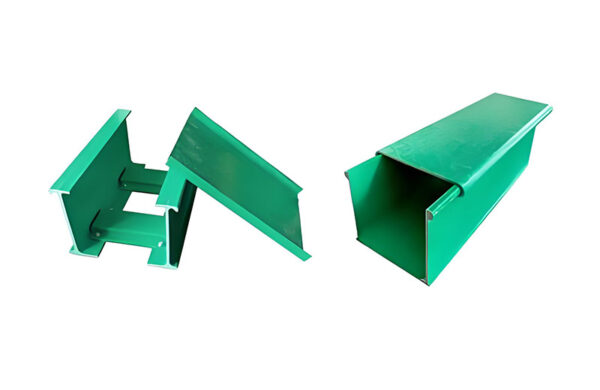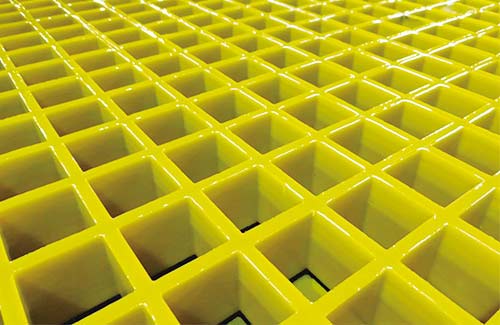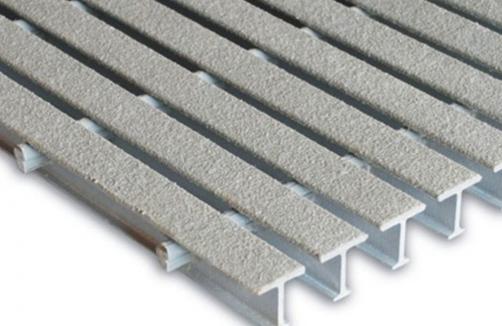Nell'ambiente esigente degli impianti chimici, dove sicurezza, durata e resistenza alla corrosione sono fondamentali, la scelta del materiale giusto per le passerelle è fondamentale. Il grigliato in plastica rinforzata con fibra di vetro (FRP) è emerso come la soluzione ideale, in quanto offre una combinazione di proprietà che lo rendono particolarmente adatto a questa difficile applicazione.
Eccezionale resistenza alla corrosione
Uno dei vantaggi più significativi del grigliato in FRP è la sua eccezionale resistenza alla corrosione. Gli impianti chimici sono pieni di una varietà di sostanze chimiche aggressive, tra cui acidi, alcali e solventi, che possono degradare rapidamente materiali tradizionali come l'acciaio e il cemento. Il grigliato FRP, invece, è costituito da una matrice polimerica rinforzata con fibra di vetro, che offre un'eccellente resistenza a queste sostanze corrosive. Ciò garantisce che il grigliato mantenga la sua integrità strutturale e la sua funzionalità per un lungo periodo, anche negli ambienti chimici più difficili.
Elevato rapporto resistenza/peso
Il grigliato in FRP offre un elevato rapporto resistenza/peso, che lo rende leggero ma incredibilmente resistente. Questa caratteristica semplifica il processo di installazione, riducendo la necessità di attrezzature di sollevamento pesanti e minimizzando i costi di manodopera. Nonostante il suo peso ridotto, il grigliato in FRP è in grado di sostenere carichi significativi, garantendo la sicurezza dei lavoratori che percorrono le passerelle dell'impianto. Inoltre, il peso ridotto del grigliato in FRP può contribuire a ridurre i requisiti strutturali del sistema di supporto sottostante, con conseguenti risparmi sui costi di costruzione.
Non conduttivo e non scintillante
La sicurezza è di estrema importanza negli impianti chimici, dove il rischio di scosse elettriche ed esplosioni è sempre presente. Il grigliato FRP non è conduttivo, eliminando il rischio di incidenti elettrici e garantendo un ambiente di lavoro sicuro per i dipendenti. Inoltre, non fa scintille, il che è fondamentale nelle aree in cui possono essere presenti gas o vapori infiammabili. Questa proprietà aiuta a prevenire l'accensione di miscele esplosive, riducendo la probabilità di incidenti costosi e pericolosi.
Superficie antiscivolo
Per migliorare ulteriormente la sicurezza, i grigliati in FRP possono essere prodotti con una superficie antiscivolo. Questa caratteristica è essenziale negli impianti chimici, dove le fuoriuscite e il bagnato sono frequenti. La superficie antiscivolo offre un'eccellente trazione, riducendo il rischio di scivolare, inciampare e cadere, anche quando il grigliato è bagnato o contaminato da sostanze chimiche. Questo non solo protegge la sicurezza dei lavoratori, ma aiuta anche a prevenire costosi infortuni sul posto di lavoro e i relativi tempi di inattività.
Facile installazione e manutenzione
Il grigliato in FRP è relativamente facile da installare rispetto ai materiali tradizionali. Può essere tagliato e sagomato in loco per adattarsi a requisiti specifici e il suo design modulare consente un montaggio rapido e semplice. Inoltre, il grigliato in FRP richiede una manutenzione minima. A differenza dei grigliati in acciaio, che necessitano di una verniciatura regolare e di misure antiruggine, i grigliati in FRP non si corrodono e non arrugginiscono. Una semplice pulizia con acqua e un detergente delicato è di solito sufficiente per mantenere il grigliato al meglio dell'aspetto e delle prestazioni.
Economicamente vantaggioso nel lungo periodo
Sebbene il costo iniziale del grigliato in FRP possa essere leggermente superiore a quello di alcuni materiali tradizionali, la sua economicità a lungo termine lo rende un saggio investimento. Grazie alla sua eccellente resistenza alla corrosione e alla sua durata, il grigliato in FRP ha una lunga vita utile, riducendo la necessità di frequenti sostituzioni. Inoltre, i risparmi in termini di installazione, manutenzione e potenziali costi legati alla sicurezza nel tempo compensano ampiamente l'investimento iniziale.
Opzioni di personalizzazione
Le griglie in FRP possono essere personalizzate per soddisfare le esigenze specifiche delle passerelle degli impianti chimici. È disponibile in una varietà di colori che consentono di identificare facilmente le diverse aree o zone di sicurezza all'interno dell'impianto. Inoltre, il grigliato può essere fabbricato con diverse capacità di carico, dimensioni delle maglie e finiture superficiali per adattarsi a varie applicazioni e requisiti.
In conclusione, il grigliato in FRP offre una serie completa di vantaggi che lo rendono la scelta ideale per le passerelle degli impianti chimici. L'eccezionale resistenza alla corrosione, l'elevato rapporto resistenza/peso, le proprietà non conduttive e antiscintilla, la superficie antiscivolo, la facilità di installazione e manutenzione, l'economicità e le opzioni di personalizzazione contribuiscono a rendere più sicuro, efficiente e affidabile l'ambiente di lavoro negli impianti chimici. Poiché la domanda di soluzioni industriali più sicure e sostenibili continua a crescere, è probabile che il grigliato in FRP svolga un ruolo sempre più importante nel futuro della costruzione e della manutenzione degli impianti chimici.
Griglie in FRP: La soluzione ideale per le passerelle degli impianti chimici
Potrebbe piacerti anche







